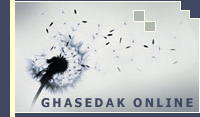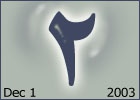Issue 2
Hamid R. Yazdi

“No,” said my friend, a dentist, “you have a point,” as we were discussing some issue strolling down the pleasant outskirts of Darband. The answer didn’t hit me that hard at that moment. It felt familiar. Of course, you start your responses with a “NO” in my culture, even if you think the other party has a point. Plus it was my first week in Iran, visiting after a couple of years. So I seemed to have forgotten how debates are conducted amongst us freedom-loving, club-of-democracy-wielding Iranians. I was, after all, now “enlightened” by the ways of the west. So I felt I had every right to study the matter using a systematic method of observation and experimentation. Why not? Isn’t that the “vazife-ye khatir,” the Cross, all we Iran-loving émigrés feel we rightly have to carry on our shoulders even if we become the crucified Messiah on the very same cross? Anyway, the long and short of it is I couldn’t help getting curious about why my dentist friend who is naturally a member of Iranian intelligentsia (come on, we really think highly of dentists, right?) had to start his answer with a “No” even though he agreed with what I was saying. Now this was something! You would think people would say “yes” when they agreed with something and vice versa. Why was this not so in Iran? Could this be another manifestation of the complexity and sophistication of our ancient culture? Was I up to something really cool that nobody else had noticed? Was this going to become a matter of a life-long pondering and study for me for which I’d win the Nobel prize or something? Or was I completely out there? Well, it didn’t hurt to try. That night I schemed to start a mock-discussion with my family and observe the results. As I plotted my clever scheme in my head, I was playing with the remote to figure out how to change channels on the “māhvāreh.” I figured it out, but suddenly out came my older brother, taking the remote from my hand and saying, “No, this is how you do it.” But that was exactly what I’d done! I collected my thoughts and decided to have a shot at my plan again. At dinner (which was not served on a table, so I can’t say “dinner table”), as I was laying out the trap I casually said, “in māhvāreh ham hichi nadāreh,” when out came my sister-in-law and said “No, he’s right.” There and then it dawned on me: I didn’t have to look too hard or plan a scheme to study the “NO” matter. It was all around me. I did notice it, by the way, on numerous other occasions, so much so that I got desensitized to it and was perfectly molded into my former self, thoroughly absorbed into this great culture that had done the same to many a great man and invader in its glorious past. And so it passed. It was now time to go back “home” to Canada. Finally I was going back to my “hamvatans,” the likes of me who had an appreciation and respect for tolerance, diversity, democratic thinking, who understood the spirit of debate. Well, I was in for a surprise – or not. That first weekend in Toronto I was watching “Porchooneh” with Behrooz, which a friend of mine had recommended as something worth watching because it was a free-debate type show. After watching the show for about, oh, half an hour I gave up counting the “NO”s. Then, on that show and many other shows like it, among my Iranian relatives and many others like them, in Iranian parties and many other places like them, I continued to hear the legendary NO, sometimes implied often stated. And now here I am trying to decipher the archetypal implications of this conundrum. But there seems to be no answer to this dilemma. You agree, NO?!












